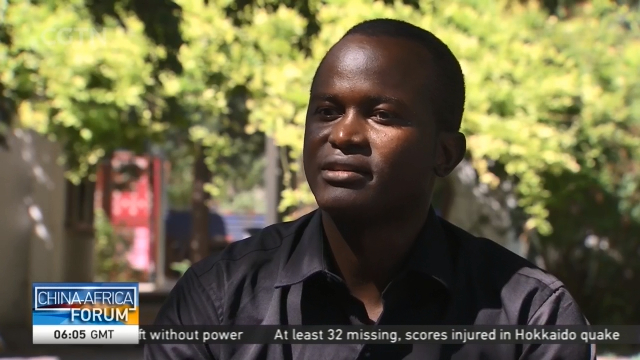
14:30, 06-Sep-2018
Building a Shared Future: Students from Algeria and Uganda on full scholarships studying in China
Updated
14:15, 09-Sep-2018
03:56

Apart from political, economic and cultural issues and programs discussed during the forum, education is one of the main points of FOCAC. Two master students from Beijing Jiaotong University talked to CGTN reporter Liu Yang about their thoughts on the forum and experiences in China.
Majoring in Master of Transportation Railway, Noureddine, from Algeria, says it was his interest in China that brought him here. Being in China for a year, Michael, from Uganda, is studying for his Master's degree in Urban Planning and Design. It is a 2 year program with a full scholarship and 3000 RMB monthly allowance. They say studying in China has allowed them to experience the country, gaining knowledge and making friends from around the world.
"Algeria and China's relationship is very strong, but after this forum, it will be stronger than before, now we need sth. for developping our country, and China help us, and I want to say thank you China for helping us."
"I think China and Africa have created a platform for discussions of various issues, in regional and intercontinental cooperation. It will bring up more infrastructure, and informational wise big data site."
FOCAC concluded with a declaration on building a community with a shared future. The Beijing Declaration crystalized a consensus of China and Africa on current major international and regional issues, and sent the world a strong signal of the two sides going forward hand in hand.
LIU YANG BEIJING "During FOCAC, Chinese President Xi Jinping said China will implement eight major initiatives with African nations in the next three years and beyond, covering fields such as industrial promotion and infrastructure connectivity. Regarding educational cooperation, he says China will set up 10 Luban Workshops in Africa to offer vocational training for young Africans, as well as provide Africa with 50,000 government scholarships, and invite 2,000 African youths to visit China for exchanges."
In addition, the declaration says China will launch a people-to-people exchange initiative. China decided to establish an institute of African studies to enhance exchanges on civilization. Qualified African educational institutions are welcome to host Confucius Institutes.
HAN MEI DIRECTOR OF SWAHILI SERVICE, CHINA RADIO INTERNATIONAL "During the forum, we saw Chinese and African leaders reach agreements on major issues. The meeting was a great success, especially in agreeing to build the China and African Media Network. We have a long time good relationship with our African colleagues, and together will explore new cooperation platforms and patterns, through our China-Africa Cooperation Media Network, and continue to tell good stories about China and African countries."
Experts say in the past decade, more than 50 thousand African students have studied in China. 54 Confucius Institutes, mainly in universities, and about 30 Confucius Classrooms set up in elementary and high schools, have been opened in 41 African nations. Liu Yang, CGTN, Beijing.

SITEMAP
Copyright © 2018 CGTN. Beijing ICP prepared NO.16065310-3
Copyright © 2018 CGTN. Beijing ICP prepared NO.16065310-3